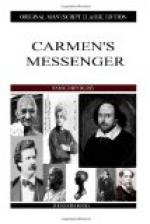“I don’t think that is quite what I want. Besides, I haven’t much time and would sooner keep to the south.”
“Then ye’ll take the high ground and go by tracks the moss-troopers rode, winding up the waters and among the fells, where there’s only cothouse clachans and lonely farm-towns. Ye’ll see there why the old Scottish stock grows firm and strong and the bit, bleak country breeds men who make it respected across the world. Man, if I had not rheumatism and some fashious business I cannot neglect, we would take the moors together!”
“You don’t seem to like the smart hotels,” Foster remarked, half amused.
“I do not like the folk they harbor. The dusty trippers in leather coats and goggles ye meet at Melrose and Jedburgh are an affront to an old Scottish town. But a man on foot, in clothes that match the ling and the gray bents, gives a human touch to the scene, whether ye meet him by a wind-ruffled lochan or on the broad moor. Ye ken he has come slowly through the quiet hills, for the love o’ what he sees. But ye will not understand an old man’s havering!”
“I think I do,” said Foster. “One learns the charm of the lone trail in the Canadian bush. But I have a map, and don’t care much where I go, so long as it’s somewhere south. Suppose you mark me out a route towards Liddesdale.”
The man did so, and jotted down a few marginal notes.
“I’m sending ye by the old drove roads,” he explained. “Sometimes ye’ll find them plain enough, but often they’re rough green tracks, and nobody can tell ye when they were made. The moss-troopers wore them deeper when they rode with the spear and steel-cap to Solway sands. Afterwards came the drovers with their flocks and herds, the smugglers’ pack-horse trains, and messengers to Prince Charlie’s friends from Louis of France. That’s why the old road runs across the fell, while the turnpike keeps the valley. If ye follow my directions, ye’ll maybe find the link between industrial Scotland and the stormy past; it’s in the cothouse and clachan the race is bred that made and keeps alive Glasgow and Dundee.”
Foster thanked him and examined the map. It was clearly drawn and showed the height and natural features of the country, which was obviously rough. The path marked out led over the Border hills, dipped into winding valleys, and skirted moorland lakes. It seemed to draw him as he studied it, for the wilderness has charm, and the drove road ran through heathy wastes far from the smoke of factories and mining towns. Well, he was ready to cross the bleak uplands, without troubling much about the mist and rain, for he had faced worse winters than any Scotland knew, but he reflected with grim amusement that Daly would find the traveling rough if he got on his trail.




